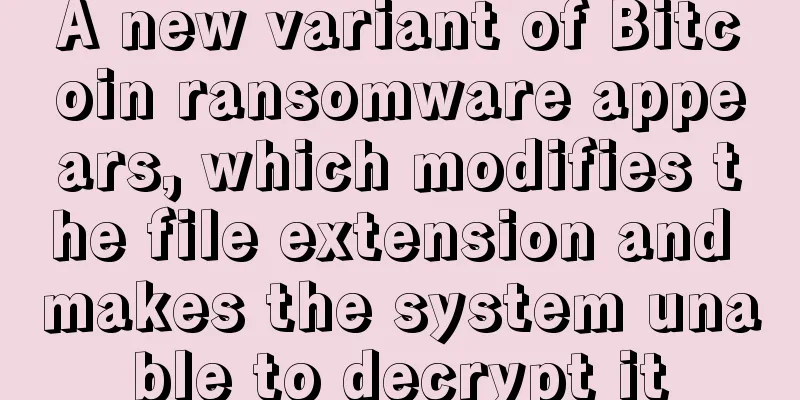A new variant of Bitcoin ransomware appears, which modifies the file extension and makes the system unable to decrypt it

|
Golden Finance News - It seems that many existing Bitcoin ransomware are undergoing some "upgrades". CryptoMix's variant software CryptFile2 has some noteworthy changes. All encrypted files of the Bitcoin ransomware CryptFile2 will now be changed to a new file extension, which will make the ransomware more difficult to crack and the number of victims will increase. After all, they cannot easily identify which type of Bitcoin ransomware has infected their system. If victims already don’t have to worry about Bitcoin ransomware attacks, the hackers of CryptFile2 decided to warn them of the danger that is just around the corner. Most types of Bitcoin ransomware infections can be easily identified by looking at the extensions of the encrypted files. However, the updated CryptoMix variant now removes the extensions of proprietary files and renames the files to the “.wallet” extension. This surprising development could have serious consequences. As a result of this change, victims of Bitcoin ransomware can no longer identify the damage done to their systems by tampering with files. In a way, this should improve the criminals' chances of getting paid. However, it remains to be seen whether the “.wallet” extension will increase demand for more people to pay the Bitcoin ransom. Consumers knowing how to pay the Bitcoin ransom is never the right answer. There is one more thing that could make the problem worse. There are several types of Bitcoin ransomware that use the .wallet extension, and CryptFile2 is just one of many variants. Dharma, Sanctions, and some other types of malware also use this extension. Moreover, people cannot communicate with the criminals through email addresses as Bitcoin ransomware does not give any type of hint. Unfortunately, current decoding programs are still unable to decrypt malicious files with the .wallet extension. Regardless of which Bitcoin ransomware caused the virus infection, security engineers are currently unable to provide any free cracking and anti-virus tools for ransomware with this extension. However, a free tool may be provided in the future, and for now, the only feasible way is to restore data from backups. As people feared, CryptFile2 spreads itself in many different ways these days. Unfortunately, there is no clear pattern for virus removal. This makes it difficult for researchers to alert the public to this new threat. Spam emails, malicious downloads, and malicious links are the most likely ways Bitcoin ransomware is spread. |
<<: ETH or ETC? The battle for supremacy in Asia is unfolding
Recommend
Men have a lot of wrinkles at the corners of their eyes when they smile, and their personalities are gentle
Through a person's facial features, we can kn...
What is the Five Dews in Physiognomy
What are the five signs in physiognomy? In physio...
Chia command line parameters
Abstract: Chia was created by Bram Cohen, the bes...
Analysis of the personality characteristics of people with short philtrums. Are people with short philtrums easy to get along with?
People with short philtrum are sincere to others ...
ETH gas price surges to over $1,000, will the second-layer network concept become the hottest thing in 2021?
Bull markets can be long, but the craziest phases...
Ambitious women with high cheekbones
A person's ambition is originally hidden in h...
Charles Schwab is interested in getting involved in crypto — just waiting for regulatory clarity
This article is from CryptoPotato, original autho...
Ethereum Mist wallet update sparks controversy, Ethereum Foundation is questioned for abandoning neutrality and favoring Coinbase
Mist, one of Ethereum’s most famous wallets, rece...
The 12 Palaces of Physiognomy: Life Palace
The 12 Palaces of Physiognomy: Life Palace The Li...
Bear or bull market? Crypto experts weigh in on recent volatility
The price of Bitcoin and many cryptocurrencies ma...
Delicate woman's nose facial features analysis of six nose types!
The nose is one of the five facial features. What...
Is Virtual Reality (VR) Really Necessary for Bitcoin and Blockchain?
Recently, the popularity of virtual reality has m...
Popular Science | What is on-chain expansion and off-chain expansion?
This is the 1346th original issue of the Vernacul...
Research shows that cryptocurrencies have three positive effects on the existing monetary system
The existence of private, decentralized cryptocur...
In-depth analysis of Bitcoin market sentiment
We compare two on-chain pricing models to the cur...









![Bitcoin Mining Network Report [Trends/Structure/Marginal Production Cost/Power Consumption and Resources]](/upload/images/67e6d4c548fcd.webp)